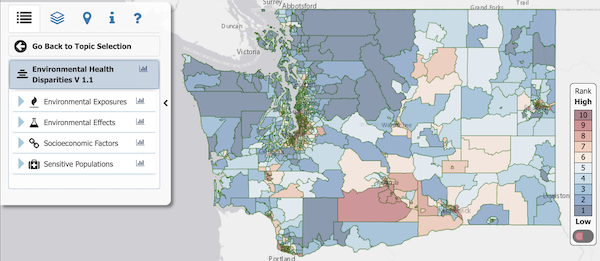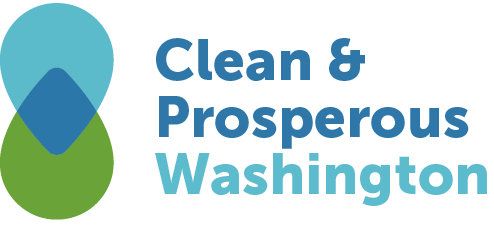Commitment to Environmental Justice
 For far too long far too many in our state have suffered a disproportionate share of environmental harm. This is not new news. We can see it mapped. And now, with the Climate Commitment Act (CCA, SSB 5126) we can do something about it.
For far too long far too many in our state have suffered a disproportionate share of environmental harm. This is not new news. We can see it mapped. And now, with the Climate Commitment Act (CCA, SSB 5126) we can do something about it.
Currently moving through the Washington state legislature, the CCA proposes to cap and reduce greenhouse gas emissions and invest in job-creating, energy-saving projects across our state. And while this is great news for everyone in Washington, it’s taking important steps for Washingtonians who live in overburdened communities.
Read the actual words in the Climate Commitment Act, sponsored by Senators Carlyle, Saldaña, Conway, Das, Frockt, Hunt, Liias, Nguyen, Pedersen, Salomon, Stanford, and C. Wilson:
“There are communities that have historically borne the disproportionate impacts of environmental burdens and that now bear the disproportionate negative impacts of climate change. Although the state has done great work in the past to highlight these environmental health disparities…the state can do much more to ensure that state programs address environmental equity.
Therefore, in establishing a program to ensure that the state’s 2030, 2040, and 2050 greenhouse gas emissions limits are achieved, the legislature intends to ensure that overburdened communities and vulnerable populations are no longer overlooked in the establishment of environmental policies.”
Here are specific ways the Climate Commitment Act advances environmental justice:
Understanding pollution in overburdened communities
- Ecology will identify overburdened communities through the Department of Health’s environmental health disparities map and track greenhouse gas emissions and criteria pollutants in those communities.
Ensuring pollution reduction for overburdened communities
- Beginning in 2025, and every two years thereafter, Ecology will conduct an Environmental Justice review of greenhouse gas emissions and criteria pollutants in overburdened communities. If pollutants are not being reduced, Ecology will identify the source of that pollution and tighten emission limits, offset limits or revise linkage agreements to ensure that pollution is being reduced.
Ensuring investments accrue to vulnerable populations
- When allocating funds from the Climate Investment Account, agencies shall conduct an environmental justice assessment and establish a minimum of not less than 35 percent and a goal of 40 percent of total investments that provide direct and meaningful benefits to vulnerable populations within the boundaries of overburdened communities.
Securing environmental justice voices in implementation
- An Environmental Justice and Equity Advisory Panel will be established to provide priority recommendations for the development and implementation of the program, the distribution of funds, and the establishment of programs, activities, and projects to achieve environmental justice and environmental health goals.
Ensuring Native American representation
- The Environmental Justice and Equity Advisory Panel will include at least one member each from Eastern Washington and Western Washington tribes. The CCA mandates that tribes must be consulted before funds are allocated from the Climate Investment Account that affect federally recognized tribes’ rights and interests in their tribal lands.
Protecting low-income residents from utility cost increases
- Allowances to utilities to mitigate the cost burden of the program, with prioritization for low-income customers.
Working Families Tax Rebate
- Climate Investment Account funds can be used to implement the Working Families Tax Rebate, a bill passed in 2008 to provide a sales tax exemption to lower-income working families but never funded.
Environmental Justice must be addressed with strong prioritization in the Climate Commitment Act. We appreciate the increased attention and structure to prioritize Environmental Justice voices and outcomes in the updated Climate Commitment Act as it works through the Senate and towards an even stronger final bill.
